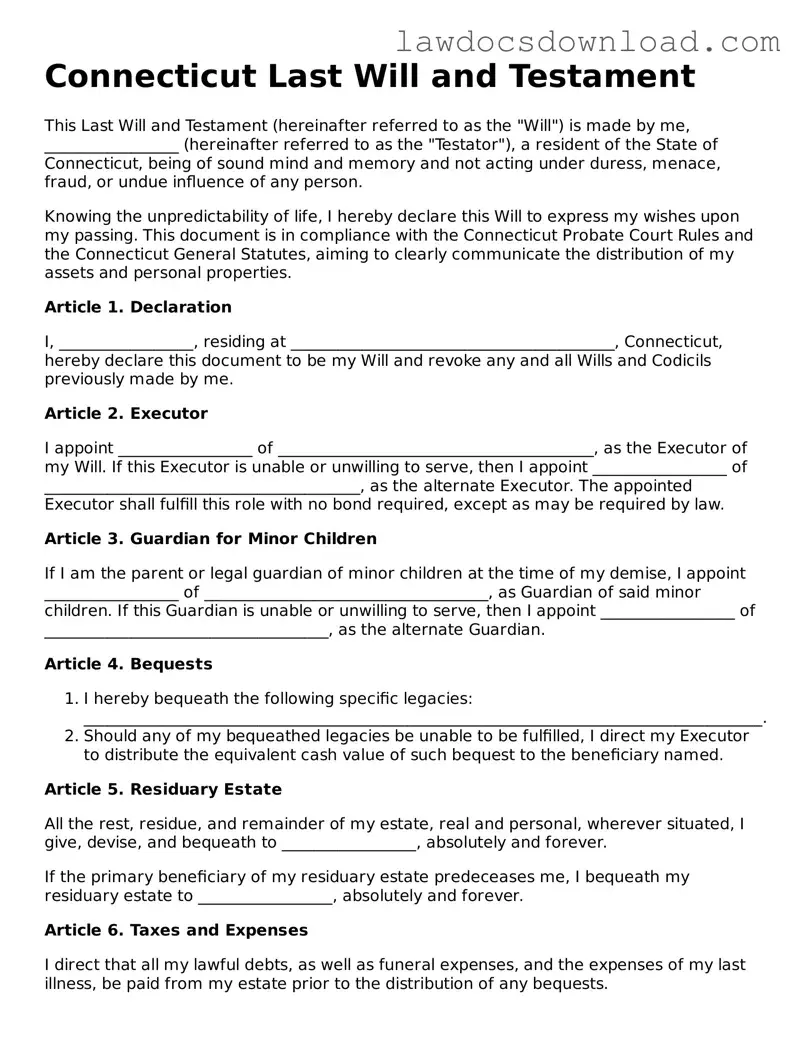Connecticut Last Will and Testament
This Last Will and Testament (hereinafter referred to as the "Will") is made by me, _________________ (hereinafter referred to as the "Testator"), a resident of the State of Connecticut, being of sound mind and memory and not acting under duress, menace, fraud, or undue influence of any person.
Knowing the unpredictability of life, I hereby declare this Will to express my wishes upon my passing. This document is in compliance with the Connecticut Probate Court Rules and the Connecticut General Statutes, aiming to clearly communicate the distribution of my assets and personal properties.
Article 1. Declaration
I, _________________, residing at _________________________________________, Connecticut, hereby declare this document to be my Will and revoke any and all Wills and Codicils previously made by me.
Article 2. Executor
I appoint _________________ of ________________________________________, as the Executor of my Will. If this Executor is unable or unwilling to serve, then I appoint _________________ of ________________________________________, as the alternate Executor. The appointed Executor shall fulfill this role with no bond required, except as may be required by law.
Article 3. Guardian for Minor Children
If I am the parent or legal guardian of minor children at the time of my demise, I appoint _________________ of ____________________________________, as Guardian of said minor children. If this Guardian is unable or unwilling to serve, then I appoint _________________ of ____________________________________, as the alternate Guardian.
Article 4. Bequests
- I hereby bequeath the following specific legacies: ______________________________________________________________________________________.
- Should any of my bequeathed legacies be unable to be fulfilled, I direct my Executor to distribute the equivalent cash value of such bequest to the beneficiary named.
Article 5. Residuary Estate
All the rest, residue, and remainder of my estate, real and personal, wherever situated, I give, devise, and bequeath to _________________, absolutely and forever.
If the primary beneficiary of my residuary estate predeceases me, I bequeath my residuary estate to _________________, absolutely and forever.
Article 6. Taxes and Expenses
I direct that all my lawful debts, as well as funeral expenses, and the expenses of my last illness, be paid from my estate prior to the distribution of any bequests.
Article 7. Miscellaneous
Any reference to "children", "descendants", "heirs", "relatives", "next of kin", or similar terms in this Will shall include those individuals who are legally adopted and shall exclude any person who is only related by marriage or individuals not legally adopted.
This Will is made and executed in the State of Connecticut and shall be governed by, and construed in accordance with, the laws of the State of Connecticut, without regard to its conflict of laws principles.
Article 8. Attestation
This Will was signed by me, the Testator, _________________, on this _____ day of _______________, 20____, in the city of ___________________, Connecticut.
In the presence of the following witnesses, who, in my presence and in the presence of each other, have hereunto subscribed our names:
- Witness #1: ___________________________________________________________________
- Witness #2: ___________________________________________________________________
- Witness #3: ___________________________________________________________________ (Optional)
Testator's Signature: _____________________________________________________
Witness #1 Signature: _____________________________________________________
Witness #2 Signature: _____________________________________________________
Witness #3 Signature: _____________________________________________________ (If applicable)

